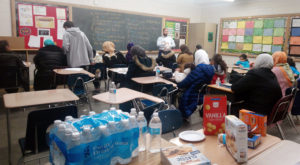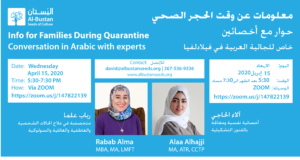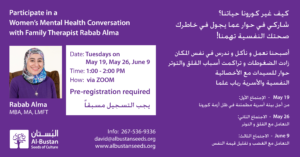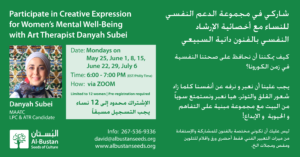Al-Bustan’s Tabadul: Reflecting on Our Immigrant Experiences Through the Arts incorporated another component to its weekly youth-focused programming. From surveys conducted by the Northeast High School ELL Department, we learned that the majority of parents want to improve their English language skills. As Spanish and Portugese are the commonly spoken languages, with Arabic the fourth most common language of heritage, we developed a program that could address the parents’ needs while applying Al-Bustan’s experience in arts and culture towards a more holistic approach in supporting immigrants’ health and well-being.
Starting in mid-October 2019, we offered NEHS parents evening classes in English language learning and arts therapy/English conversation. Over six months more than 100 Arabic, Spanish, and Portuguese speaking adults enrolled in one of three twice-a-week classes held at Northeast High School. By March 2020 we were at capacity with approximately 75 regular attendees from more than 20 countries.

The ELL classes were led by instructors Fouad Sakhnini and Harry Russell who are native or proficient Arabic and Spanish speakers. The art therapy/English conversation sessions were led by Al-Bustan’s Director of Public Education David Heayn-Menendez in consultation with art therapist Alaa Alhajji. In addition to practicing conversational English, participants responded to writing prompts and kept a journal. An endearing moment occurred when participants were asked to write a letter to their homeland. An Egyptian grandmother brought tears to the eyes of everyone in the room with the way she described her country and her need to let it go:
Like migrating birds I must leave you for now, but I will return to you one day my love.
Participants also read both fiction and non-fiction in English which served as a framework to reflect on their own family experiences.
I want to thank you for helping me, I really appreciate all you are doing for us, for our future.
We also planned monthly group conversations with family therapist Rabab Alma who is a native Arabic speaker. Parents talked with her about the stresses in their lives, their home family situations, and other topics related to mental health and wellness. Two in-person sessions took place at NEHS in late February and early March.
In an effort to provide a holistic approach to immigrant health and wellness, we arranged for monthly information sessions on topics relevant to the needs of immigrant families such as naturalization, college admission, and how to buy a house. We held a well received session on February 26 at NEHS with 30 participants. Guest speaker Mary Clark, an immigration attorney from HIAS-PA focused on the US naturalization process. Guest speakers from the 2020 US Census and the Philadelphia Mayor’s Office census initiative Philly Counts also spoke. They presented information about US Census job opportunities and the importance of reaching out to often under-counted communities in Philadelphia, such as Arab Americans, immigrants, among others. Translation was provided in Arabic, Spanish, and Portuguese.

With the city-wide shutdown starting on March 14 due to the COVID-19 pandemic, we realized the needs of the community changed, hence we shifted the emphasis of the program. On April 15, we hosted an online information session in Arabic over ZOOM focusing on the needs of Arab families during COVID-19. This session was organized in collaboration with the Philadelphia’s Office of Immigrant Affairs, the Department of Health and the Department of Behavioral Health. Guest speaker Dr. Cheryl Bettigole provided updated information from the city government and offered advice regarding the best practices to keep safe during the pandemic. A video recording can be viewed on Facebook. Family therapist Rabab Alma, and art therapist Alaa Alhajji spoke about how to pursue self-care and mental health strategies during the quarantine.
As parents expressed an interest to continue with ELL classes, we were able to shift the classes online over ZOOM. All three English sections for Arabic and Spanish/Portuguese speakers continued weekly as well as the arts therapy/English conversations. While some parents were not able to participate during the month of Ramadan, they have resumed and will continue through the end of June. Many participants are asking to continue the program past the summer.


In response to parents’ expressed needs during the quarantine, we launched a related series of mental health conversations building on the experience of the April 15th info session. From May 19 to July 6, Al-Bustan is offering Arab speaking women weekly mental health conversations and art therapy workshops in Arabic online over ZOOM with Rabab Alma and art therapist Danyah Subei. In the first couple weeks, fifteen women have participated and we hope to attract more women in the coming weeks. Registration is still open for the upcoming sessions!
Register here for Tuesdays with Rabab Alma
Register her for Mondays with Danyah Subei
This Tabadul program is supported by The Philadelphia Foundation and The Community Fund for Immigrant Wellness, a participatory grantmaking initiative. This year Al-Bustan also received general operating support from The Philadelphia Cultural Fund, Samuel Fels Fund, William Penn Foundation, and Ford Foundation.


